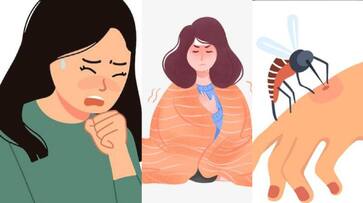Without proper sanitation in the surroundings, various diseases can spread during monsoon season. Let's explore which diseases become more prevalent during the rainy season.
Humidity levels rise significantly during the rainy season, promoting fungal growth in damp areas. This dampness can become the primary cause of various diseases and fungal infections. Mosquitoes breed in both clean and dirty water. Without proper sanitation in the surroundings, many diseases can spread. Let's explore which diseases become more prevalent during the rainy season.
Dengue
Dengue fever is transmitted through the bite of Aedes mosquitoes. Annually, between 100 and 400 million people are affected by dengue. To prevent dengue, consider installing mesh windows and using mosquito repellents as they can help reduce the risk. Always make sure that your surroundings are clean, and no stagnant water is stored in containers.
Malaria
During the monsoon, excessive water accumulation creates ideal breeding conditions for malaria-carrying mosquitoes. To prevent malaria, it's essential to stop mosquitoes from breeding by eliminating standing water around the house. Using mosquito repellent is also recommended to prevent mosquito bites.
Viral fever
Children with weaker immune systems can become more susceptible to throat infections and viral fever. To prevent viral fever, boost children’s immunity by including green leafy vegetables and vitamin C in their diet. If a child develops a high fever, seek medical advice promptly.
Diarrhoea
During this season, fungi spread quickly, increasing the risk of food contamination. Eating food from outside can lead to food poisoning or diarrhoea. Diarrhoea can cause dehydration, so it is safer to consume fresh, home-cooked meals to avoid these risks.
Infections
Infections can spread quickly through open wounds during the rainy season. If you get injured, ensure the wound is dried, treated with medicine, and bandaged properly. Leptospirosis, caused by bacteria, can lead to symptoms such as fever and stomach pain.
Last Updated Jul 26, 2024, 9:41 AM IST









![Salman Khan sets stage on fire for Anant Ambani, Radhika Merchant pre-wedding festivities [WATCH] ATG](https://static-gi.asianetnews.com/images/01hr1hh8y86gvb4kbqgnyhc0w0/whatsapp-image-2024-03-03-at-12-24-37-pm_100x60xt.jpg)
![Pregnant Deepika Padukone dances with Ranveer Singh at Anant Ambani, Radhika Merchant pre-wedding bash [WATCH] ATG](https://static-gi.asianetnews.com/images/01hr1ffyd3nzqzgm6ba0k87vr8/whatsapp-image-2024-03-03-at-11-45-35-am_100x60xt.jpg)


